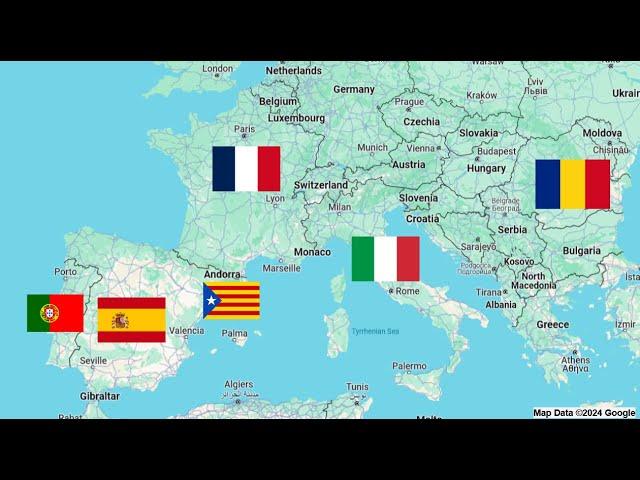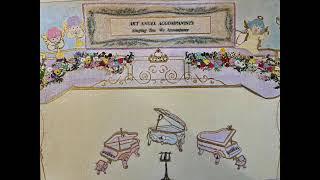
Summarizing Romance sound shifts
Комментарии:

You did not commenbt that Romanian kept, au, like aur where it was changed to o, oro
Ответить
I advice to set the speed of this video to 0.75% to make more intelligible.
Ответить
When I was in school, we took a Latin class. I'm a Spanish native speaker so I eventually started noticing patterns on how the words changed over time (you mentioned all the big ones). Neverless it was a blessing and I ended up doing worse in Spanish class (I was that kid) than Latin. Metella est in horto.
Ответить
Note that only Northern French dropped the /ə/ that descended from latin -a. In Southern French, due to Occitan influence, final -/ə/ is alive and well, so "porte" is pronounced /ˈpɔʁ.tə/, almost exactly like "porta" is pronounced in Catalan and Occitan.
Ответить
It is quite interesting how /w/ and /j/ were present in Latin, And most modern Romance languages have them (Or a similar sound), but they're not derived from the Latin ones, instead being derived form other means, Like original /i/ and /u/ being reduced before other vowels (Usually only occurring there due to the loss of a former consonant, As in "Ego"), Like you mentioned, But also from other ways, Such as the Diphthongisation, Which you mentioned in Spanish and Romanian, but also occurs in other Romance languages, just to a lesser extent, Such as Italian "Cuoco" or "Dieci" (From Latin Cocus and Decem, Respectively), Where the first part of the diphthong then became a consonant.
Ответить
Romance languages are not 6, they are at least 30 languages spread across Latin Europe, not counting the rest of the world
Ответить
Brazilian portuguese speaker from the southmost state, i tend to have a three way distinction with my Rs half of the time lol. Hard r falls under the [x] spectrum, and soft is the usual, but along these i also have an english r in one of my registers. [x] for word-initial and intervocalic doubled, english [r] for VrC, and soft [r] for the rest (word-final, CrV, intervocalic single, although on very informal registers i can drop it entirely word-finally)
Ответить
Catalan has consonant gemination, but maybe its evolution is different from the other languages that kept it from Latin?
n and m gemination are clearly visible in words like "innovar" or "emmagatzemar". I also pronounce the rare tn cluster as -nn-, for instance the word "cotna"
I think most instances of l·l have been lost and they're mostly pronounced like a simple L, but I usually pronounce tl as l·l is supposed to be pronounced
Then there are clusters like ct that I pronounce -tt-. acte --> atte, pràctica --> pràttica
However, I suspect the vowel geminations coming from written tl-, -tn-, -ct would be considered lazy pronunciation in academic circles and maybe in formal contexts there would be a tendency to properly pronounce the clusters.
Btw, Balearic Catalan does this thing called iodització where ll clusters become /j/ or completely disappear. For example, I pronounce "all" as /aj/
Whenever I say "I pronounce" in this comment I mean that I'm fairly confident that it's a widespread thing in Menorca and Mallorca, but not so sure about peninsular Catalan

Thanks for the information. You've skipped Galician by the way.
Ответить
I'm from Spain (Basque) and I'm also non-yeísta. idk if Basque being my mother language had an effect.
Ответить
Great video to watch at 0.5x speed!
Ответить
Why do you need to speak at a thousand miles per hour. 4 minutes and 10 seconds in and I'm knackered. Time to find another video :D
Ответить
You’re wrong about Romanian, Hour is Ora in Romanian
Ответить
Can you do one for slavic langauges
Ответить
I would love to watch this but you talk too damn fast. Slowing the video distorts too much, so no go.
Ответить
A small note: The original Catalan word for star is "estel" and it's still used, although less commonly than "estrella", which is a loan word from Spanish.
Ответить
the /ʝ/ to /ʃ/ chanɡe doesn't occur in chilean spanish, that's a trait of rioplatense spanish (spoken in argentina and uruguay), in chilean spanish /ʝ/ don't change the majority of times, I guess between vowels it turns to /j/ due to rapid speech.
Ответить
Portuguese also reduced the final 'a' into /ə/ (rule in Brazil) and /ɐ/ (rule in Portugal).
The natural evolution of pl, fl, cl (not sure about gl), all the other words are borrowings or semi-learned borrowings. Clamare -> chamar, planum -> chão, flama -> chama.
Also, the rule in Portuguese is the intervocalic 'l' to be dropped, all the exceptions are either learned or semi-learned borrowings, like in gelū -> geo (later replaced by gelo, a borrowing), or a modern example Volare -> Voar.

Slooooow down…..
Ответить
Ok in romanian’s defence no one says cincisprezece, its the official form but everybody says cinșpe (same with the other numbers, like unsprezece-unșpe etc)
Ответить
As a Romanian learning Italian, this is very useful!
Ответить
I know for a fact that it is taught that v is pronounced in b in Spanish sometimes, but as a native speaker with a family full of Spaniards from different regions, we always say it like v in English! It perplexes me why it's such a common claim. Love this video! I'd also like to mention that European Portuguese does the vowel reduction at the end of words. In Galego (Galician) we usually pronounce an n at the end of words like 'ng', which I find very interesting.
Ответить
Nice video
Ответить
The dark L in Brazil only happens before vowels like /a/ and /o/
Ответить
Important to say that the portuguese in the video is the brazilian variant, not the european one.
Ответить
You are talking far too fast.
Ответить
I know that it's probably easier to find information about Brazilian Portuguese and I know there are way more speakers of that dialect but, this being an "educational" video about language, it's upsetting to me that while giving examples of words, you put so many of them in the Brazilian form instead of the European one as you did with all the other languages, specially when in Spanish you showed American and European pronunciations at times and explained they're differences so accurately.
Ответить
Just one question: in Romenian, I heard the pronunciation of the word "eu" as /jew/, but in the video it's sayed that the sound is /jo/, so what's correct?
Ответить
That's not European Portuguese, that's Rio de Janeiro and other nearby states pronunciation; most other states or regions in Brazil do not pronounce it like that either.
Ответить
I think you may have gotten the terms for the Spain Spanish "s" turned around: I believe Spain's "s" is apical and Latin America's "s" is laminal.
Also, there is an interesting parallel to Romanian's kw>p/gw>b in the insular Celtic languages: the Gaelics have the PIE kw and gw changing to /k/ and g; and in Welsh, Breton, and Cornish they changed to p/b.

content: 10/10
presentation: 6/10
get that to an 8 or 9 and you'll be at 200, 300K subs in no time

Im an italian from Aosta Valley where the francoprovencal is still somehow spoken. Our language varies a lot from village to village but it is usually understood well enough. One interesting trait of this language, at least in the version spoken in the Ayas valley where im from, is that words like scuola (School in English, école in French and escuela in spanish) and stella (star in English, étoile in French and estrella in spanish) become ehcoula (where the ou is pronounced as in French) and ehtéla. The h is an aspired sound similar to the j in spanish or the h in german but softer.
Fuoco (in English fire, in French feu, in spanish fuego) is fuec.
Numbers such as tredici (13) quattordici (14) quindici (15) and sedici (16), in patois (another word for francoprovencal, similar to the word patwah like the jamaican speech)
Are called tréze, catorze, kinze and séze, very similar to French and also spanish..
The word for cheese is "fromadzo" in Aosta town but "fromadjo" in Ayas valley
Another cool thing is how we say the word "yes".
In Aosta town and towards Mont Blanc they say oué, same as French slang "ouai(s)", in Ayas we say "oi" and somewhere else (issogne and idk) they say "ai" which is surprisingly similar to scottish (?) "aye"

The "blancus" example is actually a very important piece of historical linguistic evidence proving Romanians descend from romanized Dacians rather than Vlacs who migrated there from farther west.
Ответить
"most major" is bad English.
Ответить
Occitan??
Ответить
Geminated L and N in portuguese became NH and LH, as you said palatalized!
Ответить
In romanian hora is oră and going a bit further tierra is țărână.
Ответить
Please talk slower in the next videos. And thanks, it was an interesting topic
Ответить
When did you get that Catalan flag? It's not the official one. Do your research man.
Ответить
What i learned today: Romance language speakers around the world must pool up resources to help france, becuase something is very wrong with them
Ответить
Everybody keeps forgetting a Romance Language from Switzerland which is also there 4th official Language called Romansch
Ответить
The interesting thing about “key” in Spanish is that llave and clave both exist but the contexts are different. Llave is key like the key to a door but clave is key like “the key to happiness” or something like that. Also clave is the name of a Cuban musical rhythmic pattern
Ответить
in italian "io" is definitely not pronunced as [jo]🙏
Ответить
First off there is no classical latin and vulgar latin, its just latin. But like today some people know how to speak properly and those people put those words on papper and some people that speak in slang. Either way there is only ine latin.
Ответить

























